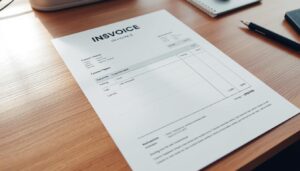Are late payments crippling your business’s cash flow? You’re not alone. According to research from Xero, late payments cost small businesses an estimated £1.6 billion in 2023.
This staggering figure highlights the need for effective strategies to manage late payments and maintain a healthy financial position. As a business owner, you understand the importance of timely payments to sustain your operations and support growth.
Key Takeaways
- Understand the impact of late payments on your business.
- Implement preventive measures before starting work with clients.
- Create invoices that get paid promptly.
- Learn effective follow-up strategies for overdue payments.
- Know your legal rights regarding late payments, including charging interest.
The Impact of Late Payments on UK Small Businesses
The issue of late payments is a persistent problem that UK small businesses face, impacting their financial health and operational efficiency. Late payments can have a huge impact on the cash flow of smaller businesses. If those late invoices become bad debts, they can leave your business struggling to survive.
Statistical Overview of Late Payments in the UK
Late payments are a frequent problem for many businesses, but effective credit control can help. Statistics show that late payments continue to plague UK small businesses, with a significant percentage of invoices being paid late. This has a direct impact on the financial stability of these businesses.
Financial and Operational Consequences
The immediate financial consequence of late payments is the disruption to cash flow, which is the lifeblood of any small business operation. Operational consequences include the inability to pay staff or suppliers on time, potentially damaging business relationships and reputation within your supply chain.
Small businesses often lack the financial reserves to absorb late payments, making them particularly vulnerable to the knock-on effects of payment delays. The time and resources spent chasing late payments represent a significant opportunity cost, diverting attention from business development and growth activities.
As “Cash flow is king” in business, late payments can severely affect your ability to manage your finances effectively. Many businesses face difficult decisions when dealing with cash flow problems caused by late payments, including taking out expensive short-term loans or delaying their own payments to suppliers, perpetuating the cycle.
“Late payment can be a major obstacle to business growth, affecting not just cash flow but also the overall financial health of a company.”
Understanding Why Clients Pay Late
To tackle the problem of late payments, it’s necessary to first understand why clients delay their payments. When your invoicing tool indicates that an invoice has been received and viewed, yet payment is not forthcoming, there may be underlying reasons for this delay.
Common Reasons for Late Payments
Clients may delay payments for various reasons. In some cases, they might be experiencing financial difficulties, making it challenging for them to settle their bills on time. At other times, they might be intentionally avoiding payment, hoping that you will give up chasing the invoice. Recognising the signs of potential payment issues early on can save your business significant time and resources.
- Clients who negotiate excessively on price or request unusual payment terms may indicate potential payment problems.
- Difficulty in reaching clients during the work process can be a warning sign that they might be elusive when it’s time to pay invoices.
Identifying Problematic Clients Early
To avoid late payments, it’s crucial to identify problematic clients early. You can do this by researching potential clients before agreeing to work with them. Checking their payment history and credit scores or asking for references from other suppliers can provide valuable insights.
- Setting up systems to track client payment behaviour over time allows you to identify patterns and take preventive measures.
- Being cautious with clients who are reluctant to sign contracts or have a history of late payments can help protect your business from potential losses.
Preventive Measures: Before You Start Working
To avoid late invoice payments, consider implementing some key strategies before you begin working with a client. Establishing a robust payment process from the outset can significantly reduce the risk of late or missed payments.
Conducting Client Credit Checks
Before engaging in any significant work, it’s prudent to conduct a credit check on your client. This helps assess their creditworthiness and mitigates the risk of non-payment. You can use credit reference agencies to obtain this information, ensuring you’re making an informed decision about whether to proceed with the work.
Establishing Clear Payment Terms
Clearly defining your payment terms is crucial. This includes specifying the payment schedule, the method of payment, and any late payment fees. It’s essential to communicate these terms effectively to your client to avoid any misunderstandings. As the saying goes, “A stitch in time saves nine,” so being proactive about payment terms can save you a lot of trouble later on.

Creating Effective Contracts
A comprehensive contract is your best protection against payment disputes. It should clearly outline the scope of work, deliverables, and payment schedule. Including specific clauses on late payments, such as your right to charge interest and suspend work if payments become overdue, is also advisable. “A good contract is like a good friend – it helps you out when you’re in a tight spot,” so having a well-structured contract is a good idea for any business.
By taking these preventive measures, you can significantly reduce the likelihood of late payments and ensure a smoother cash flow for your business.
Creating Proper Invoices That Get Paid
To avoid payment delays, it’s essential to create invoices that are accurate, clear, and comprehensive. A well-crafted invoice not only speeds up the payment process but also reflects positively on your business, showcasing your professionalism.
Essential Elements of a Professional Invoice
A professional invoice should include several key elements to ensure it is processed without delays. These include a clear date, a detailed description of the work completed, and the total amount due. It’s also crucial to include your payment details and any relevant details such as purchase order numbers or project references. By including these essential elements, you can facilitate a smooth payment process.
Common Invoice Mistakes to Avoid
Several common mistakes can lead to delays in payment or even non-payment. These include sending invoices to the wrong contact, omitting crucial information, and inconsistencies between your quote or contract and the final invoice amount. Vague descriptions of the work completed can also cause confusion, particularly in larger organisations. To avoid these issues, ensure you follow the client’s specific invoicing requirements and double-check your invoices for accuracy before sending them. By doing so, you can significantly reduce the time it takes to receive payment.
Some of the mistakes to watch out for include:
- Sending invoices to the incorrect contact person.
- Omitting crucial information such as purchase order numbers or project references.
- Inconsistencies between the quoted amount and the final invoice amount.
- Vague or insufficient descriptions of the work completed.
- Failing to adhere to the client’s specific invoicing requirements.
By being aware of these potential pitfalls and taking steps to avoid them, you can ensure that your invoices are processed efficiently, leading to faster payment and a healthier cash flow for your business.
Effective Strategies for Dealing with Late Invoice Payments
Late payments can be a significant challenge for businesses, but there are effective strategies you can employ to mitigate this issue. Managing late payments requires a combination of proactive measures and responsive actions to ensure that your business remains financially stable.
Implementing a Systematic Follow-up Process
A systematic follow-up process is crucial for dealing with late payments. This involves maintaining a record of all invoices sent and payments received, and regularly checking for any overdue invoices. You should start by sending a polite reminder to your clients shortly after the due date has passed. If the payment remains outstanding, you can escalate the matter by making phone calls or sending more assertive emails.
To enhance your follow-up process, consider using automated reminders, which can save time and ensure consistency. However, it’s essential to strike the right balance between being persistent and being overly aggressive, as the latter can damage your working relationship with the client.
Maintaining Professional Relationships During Collection
Maintaining a professional relationship with your clients, even when dealing with late payments, is vital. Building a rapport with the person in charge of paying your invoices can provide insights into any delays and potentially expedite the payment process. It’s advisable to communicate in a courteous and professional tone, avoiding any confrontational language that might jeopardize the relationship.
- Maintain a professional and courteous tone in all payment-related communications.
- Build relationships with key people in your client’s finance department.
- Separate the collection process from your ongoing working relationship.
- Listen to and address any legitimate concerns or disputes the client raises.
- Consider offering payment plans for valued clients experiencing financial difficulties.
By adopting these strategies, you can effectively manage late payments while preserving your business relationships. This approach not only helps in getting paid on time but also fosters a positive and sustainable business relationship with your clients.
Late Payment Email Templates
Effective late payment email templates are essential for maintaining a professional working relationship while ensuring timely payments.

Polite Reminder Template (Under 14 Days Late)
For invoices that are less than 14 days late, a polite reminder is often sufficient. The email should be friendly and courteous, assuming the client may have simply overlooked the invoice. A gentle nudge can be given by stating, “We understand that unforeseen delays can happen, and we wanted to kindly remind you about the outstanding invoice.”
Firm Reminder Template (14-30 Days Late)
When the payment is between 14 to 30 days late, a firmer tone is required. The email template should clearly state the invoice number, the amount due, and the original due date. It’s also a good practice to mention any potential interest or late fees that may be applied if the payment is not made promptly.
Final Notice Template (Over 30 Days Late)
For payments over 30 days late, a final notice email is necessary. This template should be direct and unambiguous, stating that it is your last attempt to resolve the matter amicably before taking further action, such as engaging a collection agency or initiating legal proceedings. The person or company should be given a specific deadline, typically 7-10 working days, to settle the outstanding amount, including any accrued interest or fees.
Charging Late Fees and Interest
Late payments can significantly impact your business, but you have legal recourse to claim interest and fees. Understanding your rights and how to implement them effectively is crucial for maintaining a healthy cash flow.
Your Legal Rights to Charge Interest
By law, you’re permitted to claim statutory interest for late payments. In England, Wales, or Northern Ireland, you can claim for up to six years in the past, and for five years in Scotland. The interest rate you can claim is up to 8% statutory interest plus the Bank of England Base Rate. Additionally, you can charge a fixed recovery fee based on the amount owed. It’s essential to clearly outline these terms in your contracts and invoices to avoid any disputes.
Key points to consider:
- Statutory interest rates apply unless otherwise specified in your payment terms.
- A fixed recovery fee can be charged based on the amount owed.
How to Implement Late Payment Fees Effectively
To effectively implement late payment fees, you should clearly communicate your late payment fee policy in all contracts and invoices. Consider implementing a graduated fee structure that increases as the payment becomes overdue. This encourages prompt resolution once a payment is late. Automating the calculation and application of late fees using accounting software ensures consistency and removes the emotional aspect of deciding when to apply them.
- Use late payment fees strategically, being willing to waive them for valuable clients with a good payment history.
- Provide advance notice when implementing fees for the first time with existing clients.
Legal Remedies and Taking Action
If your attempts to secure payment have been unsuccessful, it’s time to explore your legal options. You may need to take further action to recover your debts, and seeking independent legal advice can provide valuable guidance on the best course of action.
There are several options available to you, including negotiating a solution with the help of a mediator or making a court claim for the money owed.
Small Claims Court Process in the UK
The Small Claims Court process is a relatively straightforward and cost-effective way to resolve disputes over unpaid debts. To initiate a claim, you will need to complete a claim form, which can usually be done online or through a local court. It’s essential to ensure that you have comprehensive documentation, including contracts, invoices, and records of all communication with the debtor.
Key Steps in the Small Claims Court Process:
| Step | Description | Timeline |
|---|---|---|
| 1. Prepare Claim Form | Complete the claim form with all necessary details | Typically within 1-2 days |
| 2. Submit Claim | Submit the claim form to the court | Usually on the same day |
| 3. Serve the Defendant | The court serves the claim to the defendant | Typically within 1-2 weeks |
Working with Debt Collection Agencies
Debt collection agencies can be a cost-effective alternative to court action, typically charging either a flat fee or a percentage of the recovered amount. When selecting a debt collection agency, look for one that is registered with the Financial Conduct Authority (FCA) and follows ethical collection practices to protect your business reputation.
- Professional debt collectors have expertise in negotiating payment plans and may achieve results more quickly than court proceedings, particularly for smaller amounts.
- Be prepared to provide the agency with comprehensive documentation, including contracts, invoices, and records of all communication with the debtor.
- Consider the potential impact on your relationship with the client before engaging a collection agency, as this step typically signals the end of any business relationship.
Conclusion
The issue of late payments remains a persistent problem for many UK businesses. Implementing the strategies outlined in this guide can substantially reduce their frequency and impact on your cash flow. By investing time in proper client vetting, clear contracts, and professional invoicing processes, you can save considerable time and stress in chasing payments later.
Maintaining a systematic approach to following up on overdue payments demonstrates to clients that you take your payment terms seriously. Understanding your legal rights regarding late payments empowers you to take appropriate action when necessary. This includes charging interest, engaging collection services, or pursuing court claims.
Effective management of late payments is not just about recovering money owed; it’s also about protecting your business’s reputation, relationships, and long-term financial health. Regularly reviewing your payment processes can help identify patterns and areas for improvement. By implementing robust payment practices, you can spend less time chasing invoices and more time focusing on growing your business and serving your clients. For complex disputes, consider seeking professional advice to ensure you’re taking the best course of action.



